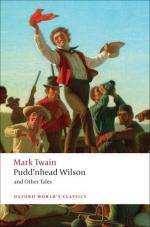’You found a meal and a half per day enough, all through the twenty-two years?’
‘Plenty.’
’Your present poor condition is due to the extra meal. Drop it out. You are trying to eat oftener than your stomach demands. You don’t gain, you lose. You eat less food now, in a day, on two and a half meals, than you formerly ate on one and a half.’
’True—a good deal less; for in those olds days my dinner was a very sizeable thing.’
’Put yourself on a single meal a day, now—dinner—for a few days, till you secure a good, sound, regular, trustworthy appetite, then take to your one and a half permanently, and don’t listen to the family any more. When you have any ordinary ailment, particularly of a feverish sort, eat nothing at all during twenty-four hours. That will cure it. It will cure the stubbornest cold in the head, too. No cold in the head can survive twenty-four hours’ unmodified starvation.’
I know it. I have proved it many a time.
CONCERNING THE JEWS
Some months ago I published a magazine article[1] descriptive of a remarkable scene in the Imperial Parliament in Vienna. Since then I have received from Jews in America several letters of inquiry. They were difficult letters to answer, for they were not very definite. But at last I have received a definite one. It is from a lawyer, and he really asks the questions which the other writers probably believed they were asking. By help of this text I will do the best I can to publicly answer this correspondent, and also the others—at the same time apologising for having failed to reply privately. The lawyer’s letter reads as follows:
’I have read “Stirring Times in Austria.” One point in particular is of vital import to not a few thousand people, including myself, being a point about which I have often wanted to address a question to some disinterested person. The show of military force in the Austrian Parliament, which precipitated the riots, was not introduced by any Jew. No Jew was a member of that body. No Jewish question was involved in the Ausgleich or in the language proposition. No Jew was insulting anybody. In short, no Jew was doing any mischief toward anybody whatsoever. In fact, the Jews were the only ones of the nineteen different races in Austria which did not have a party—they are absolute non-participants. Yet in your article you say that in the rioting which followed, all classes of people were unanimous only on one thing, viz., in being against the Jews. Now, will you kindly tell me why, in your judgment, the Jews have thus ever been, and are even now, in these days of supposed intelligence, the butt of baseless, vicious animosities? I dare say that for centuries there has been no more quiet, undisturbing, and well-behaving citizen, as a class, than that same Jew. It seems to




